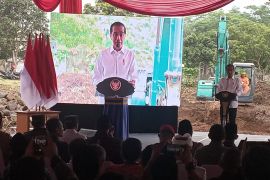With the support of the education endowment fund, we hope we can create a golden generation in 2045."Jakarta (ANTARA News) - A demographic bonus in Indonesia can lead to a positive impact on economic development and progress in the fields of agriculture and industry.
Therefore, the government and the younger generation must be prepared for the demographic bonus, predicted to happen after 2020 when the number of people in the productive age will be higher than the elderly and children.
The demographic bonus that will occur in Indonesia is a good capital in helping the development of the creative economy sector in the country, Association of Young Indonesian Businessmen (Hipmi) Chairman Anggawira has said.
"The more the number of people of productive age in Indonesia, the more the number of internet users that will increase the ability and idea to create value-added products with high quality," Anggawira said in a written statement Friday.
The strength of Indonesias creative economy is more attractive as it is supported by demographic bonus and high penetration of internet users, according to him.
Furthermore, the creative economy sector is expected to be the mainstay of Indonesias sustainable sector that should be developed in the future, he added.
Earlier, Research Technology and Higher Education Minister Muhammad Nasir said he had prepared ways to optimize the demographic bonus that will happen in Indonesia from 2020 to 2045.
"Demographic bonus is related to the productive age population between 15 and 45 years old whose number is higher than, of 67 percent of that of elderly people," Nasir said during his recent working visit to Cirebon, West Java.
The key to utilizing the demographic bonus is that the Ministry of Research Technology and Higher Education has a mission to build Indonesia through competitiveness, he noted.
Demographic bonus can have a positive impact on national development so long as correct economic policies are put in place, Vice President Jusuf Kalla has said.
The growth of population in a country may not always prove to be a burden as long as its government is able to implement a development policy, Kalla explained.
Chinas big population in the past was considered a burden but now the country realized that a huge population could be made productive, and at the same time become consumers, the Vice President said, citing Singapore and China as examples.
India has also based its policy on the same idea that a large population could be made an asset that works in favor of the countrys development.
"Singapore used to give incentives to a mother who decided not to have children but now it provides an allowance for mothers who have children," Kalla said.
In view of that, he expressed hope that the huge population of Indonesia should become a factor in pushing for national development.
"We must turn the 255 million population of the country into a workforce with high productivity, and at the same time, consumers. It all depends upon how we can manage the population to make it an asset rather than a liability," he said.
Coordinating Minister for Human Empowerment and Culture Puan Maharani said the rate of population growth in Indonesia is still high, standing at 4.5 million births per year.
"That has been the average figure over the past 10 years. Unless it is controlled by 2035, the countrys population could reach 450 million," she said.
The government has to make efforts to meet their needs of housing, food, health service and others, she said citing the implications of this increase in population.
The endowment fund held by the Education Fund Management Agency (LPDP) is expected to help create golden generation in Indonesia in 2045, Finance Minister Bambang Brodjonegoro has said.
"With the support of the education endowment fund, we hope we can create a golden generation in 2045," the minister had said some time ago.
He hoped the fund would be sustained and that Indonesia would be competitive in human resources more than in natural resources in 2045.
In 2045, it is expected that 75 percent of Indonesian youths between 19 and 23 years of age are studying at high educational institutes, he added.
"We must utilize the momentum of demographic bonus and make sure that people of productive age are knowledgeable and highly innovative. This is the importance of development of education to create a golden generation in 2045," he said.
He called for active participation of all in the control of the spending of the fund to ensure that the fund is properly utilized.
Transmigration is one of the main programs to tackle with regard to the swelling population, Minister in Charge of Rural Affairs, Backward Areas and Transmigration Marwan Jafar said.
"A demographic bonus could bring about disaster unless it is properly controlled with good planning," Marwan said here last August.
The transmigration program which has been for long out of the spotlight would be revived, he said.
Transmigration is important in Indonesia as the country has a high rate of population explosion, according to him.
The program of transmigration has proven to have made a considerable contribution to economic growth in various scarcely populated areas, he said, while citing that transmigration has succeeded in bringing modernity to Papua.
The minister asked regional administrations to facilitate transmigration.
(T.O001/INE/KR-BSR)
Reporter: Otniel Tamindael
Editor: Priyambodo RH
Copyright © ANTARA 2015












